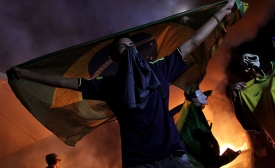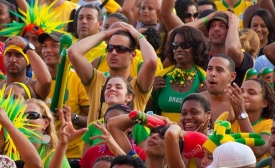brazil
Five minutes before the first match of the World Cup, 400 people were packed into the residence of Brazilian Ambassador Mauro Vieira for Thursday’s opening game from São Paulo. Men, women, even babies were transfixed by the 10 huge television screens, afraid to miss one second of the action. In this alternate universe, the gods are bronzed-faced Adonises and everyone bleeds yellow and green. Every four years, diplomatic Washington takes an unofficial sabbatical. Embassies insist that work will continue uninterrupted during the month-long World Cup. Everyone is lying.
Brazil’s jogo bonito is globally recognized as an ideal combination of sports, culture, and national personality. Given this backdrop, Cobi Jones and Tiffany Roberts Sahaydak, visited Manaus, Brasília, Fortaleza, Natal, and Recife as U.S. Department of State Sports Envoys to share more about their experiences off-the-pitch than on it. The Bureau of Educational and Cultural Affairs together with Mission Brazil partnered to implement the “Sports for All” strategy that uses sports to engender greater social inclusion, promote education, and teach job skills.

As the 2014 FIFA World Cup kicks off to fanfare and protest, we see how soccer and sports diplomacy can improve the image and soft power of Brazil.
As Brazil prepares for the World Cup kick-off this Thursday, CPD asked a few experts from the public diplomacy community for their thoughts on what hosting the tournament means for Brazil’s soft power.
Brazil’s hosting of the 2014 FIFA World Cup was perceived as an economic, political and soft power coup for the country when it was announced as the host in late 2007. But it has become mired in labor disputes, not-yet-completed infrastructure, laughable gaffes, deadly accidents and massive social unrest.

The lasting legacy of the 2014 FIFA World Cup will not be the grand infrastructure or (questionable) economic boom promised by their FIFA overlords.

The World Cup might not be all hearts and roses for Brazil.
Argentina, the United States and Iran appear to be the most disliked World Cup teams. Brazilian fans enter the World Cup as the most confident, though Argentines and Spaniards aren’t far behind in their home-country optimism. And fans across many countries agree that the Brazilians play the most attractive form of soccer. These are among the results from a study of people in 19 countries conducted by YouGov, the online survey firm, in collaboration with The Upshot.







